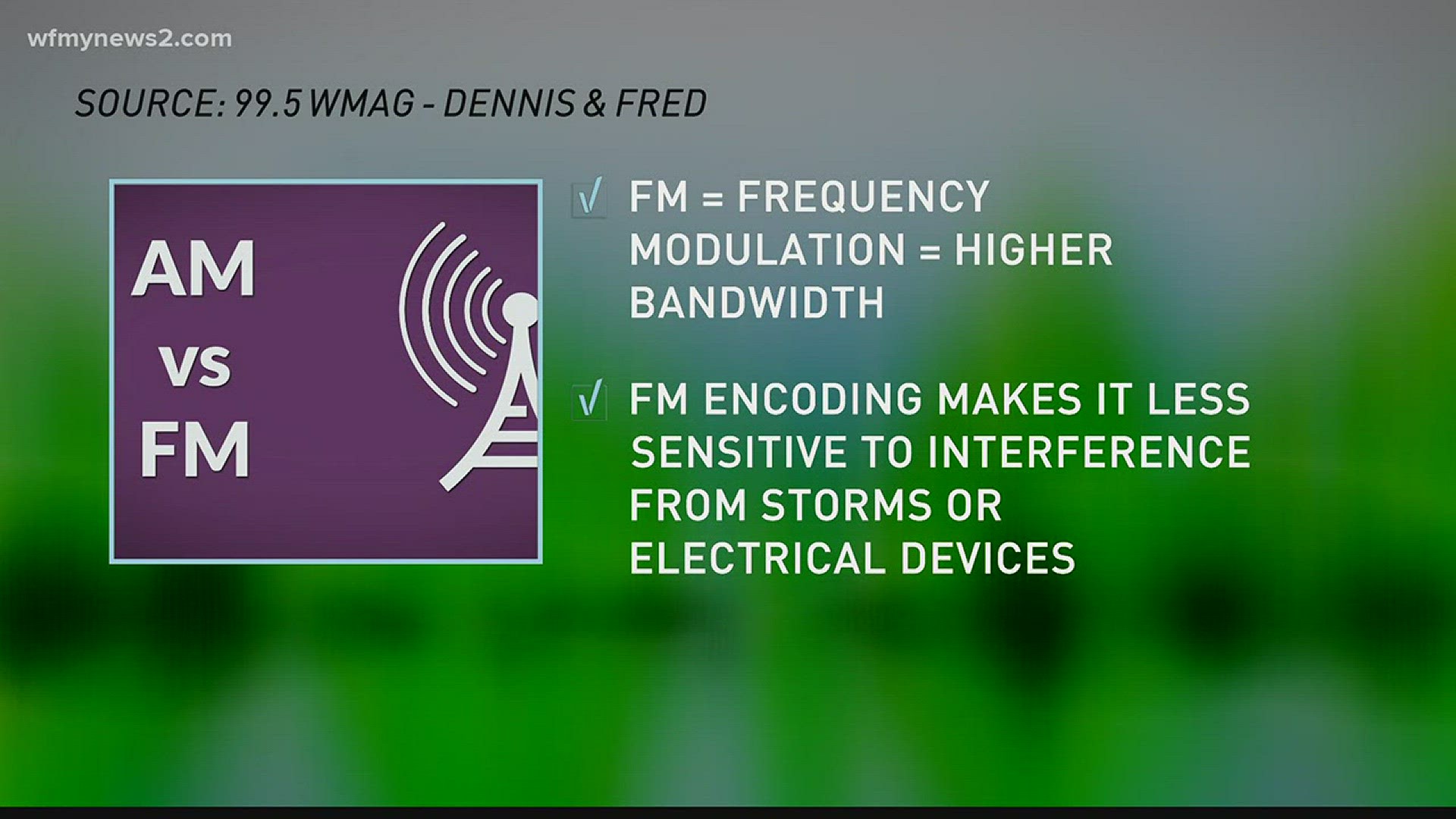Why FM is more better than AM?

Why FM radio is better than AM
FM has better sound quality due to higher bandwidth. AM radio ranges from 535 to 1705 KHz (OR) Up to 1200 bits per second. FM radio ranges in a higher spectrum from 88 to 108 MHz. (OR) 1200 to 2400 bits per second.
Which one is better AM or FM
In addition FM waves give better sound reproduction. With an FM broadcast, slight changes in amplitude don't matter at all — since the audio signal is conveyed through changes in frequency, the FM receiver can just ignore changes in amplitude. The result: better sound reproduction.
Why is FM clearer
Each FM station is allocated 150 kHz of bandwidth, which is 15 times that of an AM station. This means that an FM station can transmit 15 times as much information as an AM station and explains why music sounds so much better on FM.
What is the principle of FM radio
Frequency modulation (FM) is a type of angle modulation in which the frequency of a sinusoidal carrier wave deviates from a center frequency by an amount proportional to the instantaneous value of the message signal. In FM, the center frequency is the carrier frequency.
Why does FM radio sound so good
"FM, which stands for Frequency Modulation, has better sound quality due to higher bandwidth. Also, the way the audio is encoded for FM makes it less sensitive to interference from electrical activity from storms or electrical devices than AM.
Why is FM signal preferred over AM signal
During modulating process, the noise gets amplitude modulated. Since it brings about variations only in the amplitude of carrier waves, it does no harm to the message signal. For this reason, FM signal is less susceptible to noise than an AM signal.
Does AM or FM use more power
Power Consumption: FM based signal transmission consumes a higher amount of power than an equivalent AM based signal transmission system.
Does FM have more energy than AM
FM = frequency modulated, short l, eg 92.1 MHz (Mega = 106). Since these radio waves are shorter than AM waves they can also carry more energy and are able to penetrate objects more easily.
Why does AM radio sound bad
FM radio operates at a higher frequency than AM, between 88 megaHertz (mHz) and 108 mHz, and each station is allowed 150 kHz of bandwidth — which means they can transmit 15 times more information at once than an AM station. That's why music typically sounds much clearer on FM radio than on AM.
Why use FM
With FM, the frequency (the number of times each second that the current changes direction) of the carrier signal is varied. FM signals have a great advantage over AM signals. Both signals are susceptible to slight changes in amplitude. With an AM broadcast, these changes result in static.
Why FM is used for sound
Frequency modulation (FM)
Because the frequency of a radio wave is less vulnerable to noise than the amplitude, FM was originally introduced to reduce noise and improve the quality of radio reception. In order to accomplish this, FM radio signals have bandwidth several times that of AM signals.
Why is FM immune to noise
During modulating process, the noise gets amplitude modulated. Since it brings about variations only in the amplitude of carrier waves, it does no harm to the message signal. For this reason, FM signal is less susceptible to noise than an AM signal.
Why is FM signal weak
Causes of Poor FM Radio Reception
Distance: You may be too far from a station transmitter to receive a good signal. If you're too close to a transmitter, the signal may overpower your radio. Stationary obstacles: Radio signals can be affected by physical obstacles such as hills, buildings, and trees.
Why do we use FM radio waves more often than AM waves signals
Frequency modulation allows FM waves to encode more information than does amplitude modulation, so FM broadcasts usually produce clearer sounds than AM broadcasts. However, the relatively short wavelengths of FM waves means that they don't reflect off the ionosphere as AM waves do.
Why FM is preferred over PM
Answer: FM has higher bandwidth, due to which it is less affected by noise interference. Hence, the signal quality of FM is better than PM.
Why FM uses higher frequency
Because the frequency of a radio wave is less vulnerable to noise than the amplitude, FM was originally introduced to reduce noise and improve the quality of radio reception. In order to accomplish this, FM radio signals have bandwidth several times that of AM signals. Bandwidths six times or larger are common.
Why does AM go farther than FM
Since AM radio operates at a lower frequency, it has much larger wavelengths. Larger wavelength waves can travel farther because they can travel well through solid objects. FM radio waves on the other hand do not travel well through solid objects.
Why FM is more immune to noise than AM
During modulating process, the noise gets amplitude modulated. Since it brings about variations only in the amplitude of carrier waves, it does no harm to the message signal. For this reason, FM signal is less susceptible to noise than an AM signal.
Why is AM radio worse at night
This change in AM radio propagation occurs at sunset due to radical shifts in the ionospheric layers, which persist throughout the night. During daytime hours when ionospheric reflection does not occur to any great degree, AM signals travel principally by conduction over the surface of the earth.
Why do you listen to FM radio
The percentage of AM/FM radio listeners who cite various main reasons for listening, including: easiest to listen in the car; it's free; DJs/hosts/shows; hear favorite songs/artists; feel a connection with radio; in the habit of listening; like to work with radio; to be informed about the news; to be informed in an …
Why is FM power efficient
When MA reaches unity, the power consumption is 100%. In FM systems, the power of the transmitted signal is proportional to the amplitude of the unmodulated carrier signal and it is constant. Therefore, FM is usually more power-efficient than AM systems.
What are the advantages of FM over AM
The main advantages of FM over AM are: Improved signal to noise ratio (about 25dB) w.r.t. to man made interference. Smaller geographical interference between neighboring stations. Less radiated power.
What is the advantage of FM
In radio transmission, frequency modulation has a good advantage over other modulation. It has a larger signal-to-noise ratio, meaning it will reject radio frequency interferences much better than an equal power amplitude modulation (AM) signal. Due to this major reason, most music is broadcasted over FM radio.
What is the advantage of FM signal
In radio transmission, frequency modulation has a good advantage over other modulation. It has a larger signal-to-noise ratio, meaning it will reject radio frequency interferences much better than an equal power amplitude modulation (AM) signal. Due to this major reason, most music is broadcasted over FM radio.
What are the advantages of FM
Advantages of Frequency Modulation
Frequency Modulation decreases the noise; hence, there is a significant increase in the signal to noise ratio. We can also reduce the noise by increasing the frequency deviation. It also reduces the interference by the adjacent channels through guard bands.



0 Comments